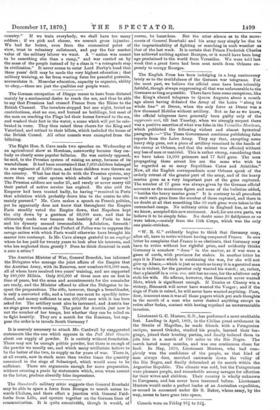Lieutenant G. C. Musters, R.N., has performed a moat creditable
feat. Landing in April, 1869, in the Chilian penal settlement in the Straits of Magellan, he made friends with a Patagonian cacique, named Orkeke, studied his people, learned their lan- guage, joined their hunting parties, and finally induced them to join him in a march of 700 miles to the Rio Negro. The march lasted many months, and was one continuous chase for food. In May, 1870, Lieutenant Musters, who had com- pletely won the confidence of the people, as that kind of man always does, marched eastwards down the valley of the Rio Negro, and finally debouched at its mouth within the Argentine Republic. The climate was cold, but the Patagonians were pleasant people, and remarkable among savages for affection for their wives and children. Their country is wholly unknown to Europeans, and has never been traversed before. Lieutenant Musters would make a perfect leader of an Australian expedition, or second in command under Sir S. Baker, whose army, by the way, seems to have gone into space.






































 Previous page
Previous page